family roles pdf
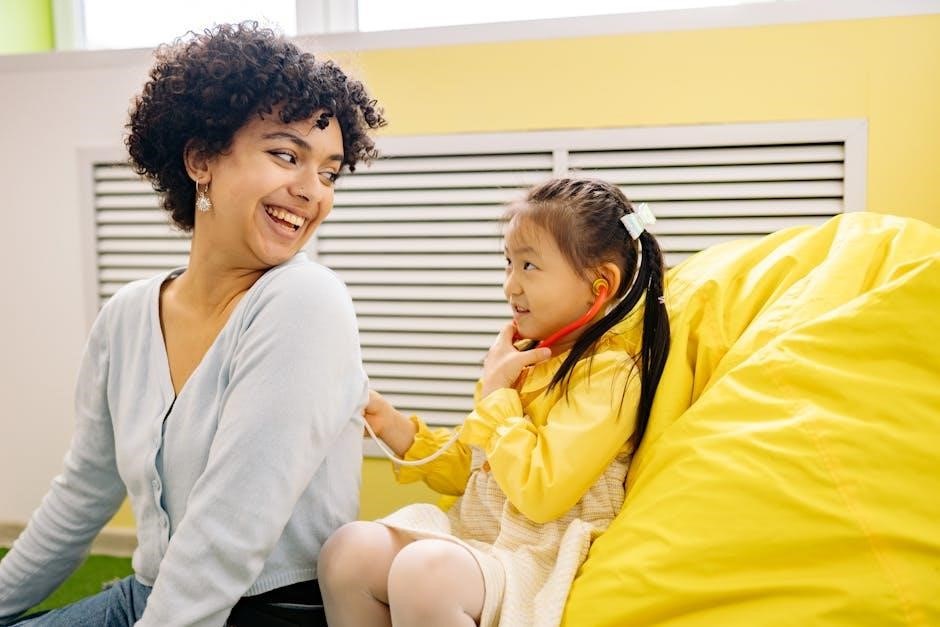
Family roles are essential in shaping individual behaviors and maintaining balance within a family system․ Often assigned based on birth order or behavior‚ these roles help establish harmony and responsibility‚ though they can also become limiting if rigidly defined․
1․1 Definition and Overview of Family Roles
Family roles refer to the patterns of behavior and responsibilities assigned to individuals within a family system․ These roles‚ often shaped by birth order or behavior‚ help maintain balance and order․ They can be functional‚ fostering harmony‚ or dysfunctional‚ leading to conflict․ Understanding these roles is crucial for addressing family dynamics and promoting healthy relationships․
1․2 Importance of Family Roles in Family Dynamics
Family roles play a crucial role in shaping interactions and maintaining stability within families․ They provide structure‚ guiding how members relate to one another and fulfill responsibilities․ Healthy roles promote emotional well-being and cooperation‚ while dysfunctional ones can lead to conflict․ Recognizing these roles is essential for fostering resilience and positive family dynamics․
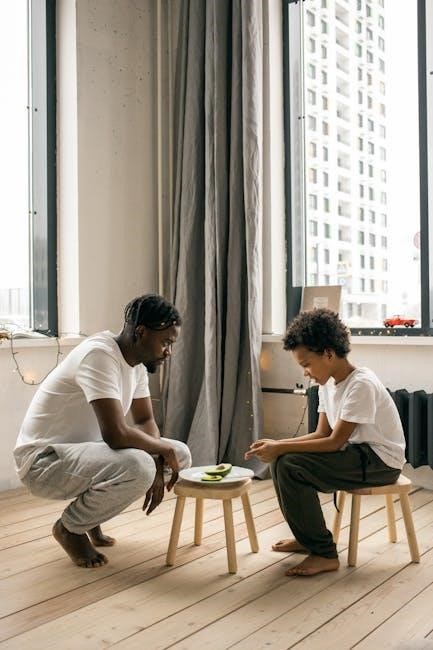
Different Types of Family Roles
Families often develop distinct roles such as the Hero‚ Scapegoat‚ Lost Child‚ Mascot‚ Caretaker‚ and Mastermind‚ each serving unique functions within the family system․
2․1 The Family Hero
The Family Hero often emerges as the oldest child‚ taking responsibility for fixing the family’s emotional pain․ They strive to be perfect‚ achieving academically or socially to gain approval‚ which can lead to high expectations and stress․
2․2 The Scapegoat
The Scapegoat often bears the brunt of family dysfunction‚ blamed for issues beyond their control․ This role involves absorbing negative emotions‚ leading to potential emotional distress and low self-esteem․ Scapegoats may feel isolated but sometimes develop resilience and empathy‚ which can aid in coping with their challenging position within the family system․
2․3 The Lost Child
The Lost Child often withdraws from family dynamics‚ seeking comfort in isolation or distractions․ This role involves avoiding conflict and emotional engagement‚ which can lead to feelings of detachment․ While this coping mechanism provides temporary relief‚ it may result in long-term difficulties in forming emotional connections and expressing personal needs effectively within the family system․
2․4 The Mascot
The Mascot uses humor‚ positivity‚ and charm to balance family dynamics and distract from underlying tensions․ This role often involves being the “fun” family member‚ fostering a sense of lightness․ While the Mascot brings relief‚ they may also avoid addressing their own emotional pain‚ potentially masking deeper issues and hindering personal growth if not acknowledged and addressed over time․
2․5 The Caretaker
The Caretaker assumes emotional and practical responsibilities‚ often prioritizing others’ needs over their own․ This role involves managing family dynamics‚ mediating conflicts‚ and providing emotional support․ While the Caretaker ensures stability‚ they may neglect their own well-being‚ leading to burnout․ Their selflessness can inadvertently create dependency‚ highlighting the need for balance between nurturing others and self-care to maintain long-term health and harmony․
2․6 The Mastermind
The Mastermind often assumes a strategic‚ controlling role‚ influencing family decisions and dynamics․ This individual may manipulate situations to maintain power‚ providing structure but also fostering dependency․ Their analytical nature can offer stability‚ yet their tendency to dictate outcomes may lead to resentment․ The Mastermind’s influence can be both constructive and suffocating‚ shaping the family’s direction while sometimes undermining others’ autonomy and growth․
The Role of the Family Hero
The Family Hero often emerges as the oldest child‚ taking on the responsibility of fixing the family’s emotional pain and becoming overly responsible‚ which can lead to personal burden and stress․
3․1 Characteristics of the Family Hero
The Family Hero is often responsible‚ self-reliant‚ and driven to succeed‚ taking on the role of fixing family issues․ They may exhibit perfectionism‚ people-pleasing behaviors‚ and a strong need for approval‚ which can lead to emotional burden and stress due to their high expectations and the pressure to maintain stability within the family system․
3․2 Responsibilities and Challenges
The Family Hero often takes on responsibilities like mediating conflicts‚ setting high standards‚ and being a role model․ They may feel pressured to succeed and maintain order‚ leading to challenges such as perfectionism‚ emotional suppression‚ and burnout․ The weight of expectations can create an emotional burden‚ making it difficult to balance personal needs with family obligations․
The Impact of Dysfunctional Family Roles
Dysfunctional family roles can lead to emotional issues‚ strained relationships‚ and a lack of personal growth․ They often result in long-term effects on mental and emotional well-being․
4․1 Effects on Individual Members
Dysfunctional family roles significantly impact individual members‚ often leading to low self-esteem‚ anxiety‚ and depression․ Rigid roles can limit personal growth‚ creating dependency and feelings of entrapment․ This prevents individuals from developing their own identities and healthy coping mechanisms‚ ultimately contributing to long-term mental health challenges․
4․2 Consequences for Family Relationships
Dysfunctional family roles often lead to strained relationships‚ poor communication‚ and unresolved conflicts․ Members may feel resentful or overburdened‚ fostering an environment of mistrust and emotional distance․ This can result in a breakdown of collaboration and mutual support‚ ultimately weakening the family bond and creating a cycle of dysfunction that is challenging to reverse․
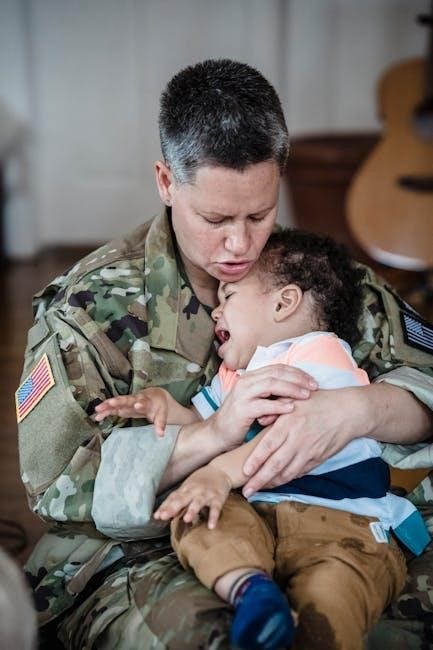
Understanding the Scapegoat in Families
The scapegoat is often blamed for family issues‚ diverting attention from real problems․ This role can lead to emotional distress‚ fostering resentment and low self-esteem in the individual․
5․1 Role and Behavior Patterns
The scapegoat often adopts behaviors to cope with being blamed‚ such as rebellion or withdrawal․ They may act out to provoke reactions‚ reinforcing their role․ Over time‚ this can lead to self-doubt and a distorted self-image‚ as they internalize the negativity directed toward them‚ making it harder to break free from this pattern․
5․2 Psychological and Emotional Implications
The scapegoat often internalizes negativity‚ leading to low self-esteem and self-doubt․ Emotional feelings of resentment and alienation may develop‚ as well as a sense of injustice․ Over time‚ this role can result in difficulty trusting others and forming healthy relationships․ The psychological toll may also manifest as anxiety or depression‚ highlighting the profound impact of being unfairly blamed and marginalized within the family system․
The Caretaker’s Role and Its Challenges
The caretaker‚ often the oldest child‚ takes on excessive responsibilities‚ managing household tasks and emotional needs․ This role can lead to burnout and hinder personal development‚ emphasizing the need for balance and support to prevent long-term emotional strain and resentment․
6․1 Emotional and Practical Responsibilities
The caretaker often assumes both emotional and practical responsibilities‚ managing daily tasks and providing support to family members․ This dual role can lead to emotional exhaustion and stress‚ as they frequently prioritize others’ needs over their own‚ highlighting the need for self-care to maintain their well-being and effectiveness in their role․
6․2 Burnout and Stress Related to Caretaking
Caretakers often experience burnout due to the emotional and practical demands of their role․ Constantly prioritizing others’ needs can lead to emotional exhaustion and stress․ Without proper boundaries or support‚ caretakers may feel overwhelmed‚ struggling to maintain their own well-being․ This highlights the importance of self-care and seeking help to prevent long-term emotional and physical strain․
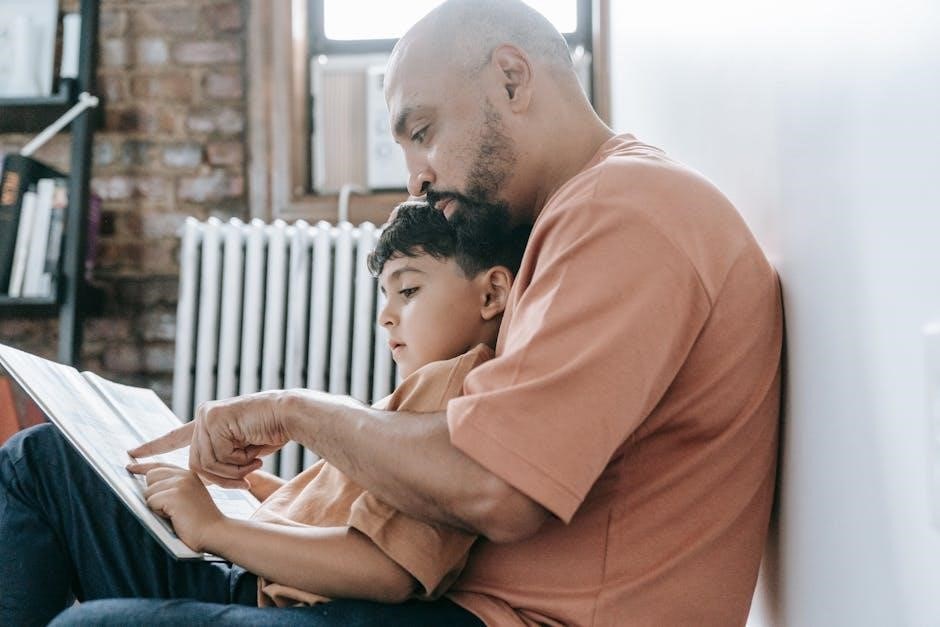
The Lost Child and Their Struggles
The lost child often struggles with feelings of invisibility and disconnection‚ coping through withdrawal and internalized emotions‚ which can hinder their ability to seek support or express needs effectively․
7․1 Characteristics and Coping Mechanisms
The lost child often exhibits traits of withdrawal and emotional detachment‚ avoiding conflict to maintain peace․ They may internalize feelings‚ becoming overly self-reliant and distant from family interactions․ Coping mechanisms include isolating themselves or engaging in solitary activities‚ which provides temporary relief but can deepen feelings of disconnection and invisibility within the family system over time․
7․2 Long-Term Effects on Personal Development
The lost child often struggles with identity formation and emotional expression․ Their detachment can lead to difficulties in forming intimate relationships and trusting others․ Over time‚ this role may hinder self-confidence and independence‚ as they may feel neglected or unimportant‚ affecting their ability to assert themselves and pursue personal goals effectively in life․
The Mascot: Bringing Balance to Families
The mascot role involves using humor and positivity to uplift the family‚ often masking personal struggles․ This role fosters harmony and reduces tension‚ creating emotional balance within the family system․
8․1 Role in Maintaining Family Harmony
The mascot plays a crucial role in maintaining family harmony by using humor and positivity to uplift others․ This role often involves diverting attention from conflicts and providing emotional support‚ fostering a sense of unity and balance․ The mascot’s ability to remain optimistic helps reduce tension and creates a more cohesive family environment‚ even in challenging times․
8․2 Challenges of Being the Mascot
The mascot often faces challenges‚ such as emotional suppression and being overlooked for serious issues․ Their role of maintaining positivity can lead to feelings of isolation and denial of personal struggles․ Additionally‚ the pressure to constantly uplift others may prevent them from expressing genuine emotions‚ creating internal conflict and emotional strain over time․
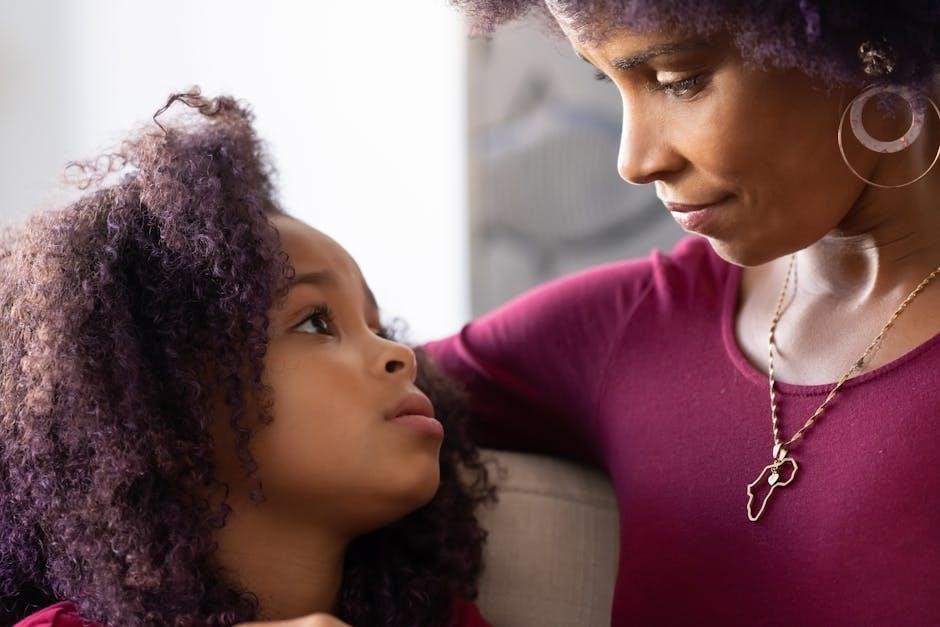
The Mastermind’s Influence on Family Dynamics
The Mastermind often uses strategic thinking to influence decisions‚ balancing control with manipulation․ Their role can stabilize the family but may also lead to power imbalances and resentment․
9․1 Strategic Thinking and Decision-Making
The Mastermind excels in strategic planning‚ often making decisions that steer family dynamics․ Their analytical nature helps resolve conflicts but can sometimes lead to over-control‚ stifling others’ input and fostering dependency on their guidance․
9;2 Potential for Manipulation and Control
The Mastermind’s influence can sometimes lead to manipulation‚ as they may use their strategic mindset to control family decisions․ This control can create power imbalances‚ limiting others’ autonomy and fostering resentment․ While their intentions may be to maintain order‚ it often results in unhealthy dynamics and emotional strain within the family system․
Redefining Family Roles in Modern Times
Modern families increasingly share responsibilities‚ moving away from traditional roles․ Shifting expectations and evolving social norms drive this change‚ fostering more equitable and flexible family dynamics today․
10․1 Shifting Responsibilities and Expectations
Modern families are embracing shared responsibilities‚ moving beyond traditional gender roles․ Both parents increasingly contribute to financial and household tasks‚ creating a more balanced home environment․ This shift reflects evolving societal expectations and the need for equitable contributions‚ fostering mutual respect and reducing individual burdens․ Children also take on more shared responsibilities‚ promoting a sense of teamwork and fairness within the family structure․
10․2 Impact of Changing Social Norms
Changing social norms have significantly influenced family roles‚ promoting gender equality and shared responsibilities․ Traditional roles are being replaced by more collaborative approaches‚ with both parents contributing to caregiving and financial support․ This shift fosters a more balanced and inclusive family environment‚ reflecting broader societal changes and the evolving expectations of modern families․ Adaptability has become key to maintaining harmony in these dynamics․
The Evolution of Family Roles Over Time
Family roles have evolved significantly‚ shifting from traditional gender-defined responsibilities to more flexible‚ collaborative approaches․ Modern families embrace shared duties‚ reflecting societal changes and diverse expectations over generations․
11․1 Historical Perspectives on Family Roles
Historically‚ family roles were rigidly defined‚ often based on gender and societal norms․ Fathers were typically providers‚ mothers managed households‚ and children had specific responsibilities․ These roles were seen as essential for maintaining order and stability within families‚ reflecting the cultural and economic needs of earlier times‚ with little flexibility for individual expression or change․
11․2 Modern Trends and Future Predictions
Modern families increasingly embrace flexible roles‚ with responsibilities shared more equally․ Gender stereotypes are fading‚ and adaptability is valued․ Technology and education have empowered individuals to redefine their roles․ Future trends may see further fluidity‚ prioritizing personal growth and mutual respect․ Families are likely to focus on balancing individuality with unity‚ fostering healthier dynamics and stronger bonds across generations․
Understanding family roles is crucial for recognizing their impact on individual and relational well-being‚ fostering healthier dynamics and stronger connections within families over time․
12․1 Summary of Key Points
Family roles‚ such as the hero‚ scapegoat‚ and caretaker‚ shape individual behaviors and maintain balance within the family system․ These roles often emerge based on birth order or behavior‚ providing structure but sometimes becoming rigid․ Understanding these roles is essential for fostering healthier dynamics‚ addressing dysfunction‚ and promoting personal growth․ Recognizing their impact helps families move toward more balanced and resilient relationships over time․
12․2 Final Thoughts on the Significance of Family Roles
Family roles significantly influence individual behaviors and family dynamics‚ shaping identities and interactions․ While they provide structure‚ rigid roles can limit growth․ Recognizing and addressing these patterns fosters healthier relationships and personal development․ Embracing flexibility and understanding the emotional and psychological impacts of these roles is crucial for creating balanced‚ resilient families in modern society․